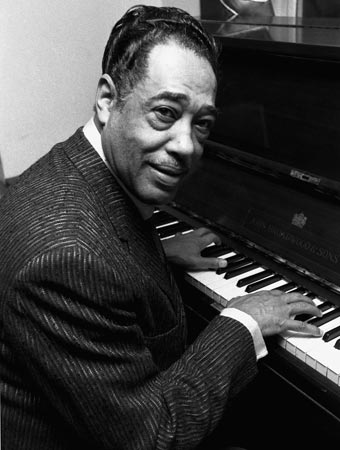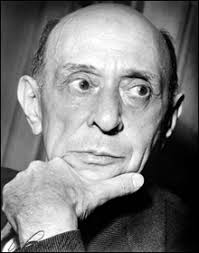Swing music, swing jazz, or just swing: it was big through the 1930's and 40's, with a sophisticated sound and an exciting swing. It made people want to dance. Swing music is composed of good rhythm and fast tempos. Swing music took a decline guring WWII. Because of the war, two many musicians were over seas and it was tough to get enough people together to form a band and play. Touring became harder, due to costs and restrictions. There are so many famous musicians of the swing era, it's hard to choose a favorite but my top would have to be Ben Webster, Count Basie, Dunke Ellington, Fletcher Henderson, and the Andrews Sisters. Swing music is really fun and eventhough it's an older type of music I really enjoy it. I mean alot if people to do; the rhythms are great and even the occasional vocals.
A rather famous swing song is "It don't mean a thing" by Duke Ellington, in 1931. The lyrics go:
It don't mean a thing, if it ain't got that swing
(doo-ah, doo-ah, doo-ah, doo-ah, doo-ah, doo-ah, doo-ah, doo-ah, doo-ah)
It don't mean a thing all you got to do is sing
(doo-ah, doo-ah, doo-ah, doo-ah, doo-ah, doo-ah, doo-ah, doo-ah, doo-ah)
It makes no difference
If it's sweet or hot
Just give that rhythm
Everything you've got
It don't mean a thing, if it ain't got that swing
(doo-ah, doo-ah, doo-ah, doo-ah, doo-ah, doo-ah, doo-ah, doo-ah, doo-ah)
It don't mean a thing all you got to do is sing
(doo-ah, doo-ah, doo-ah, doo-ah, doo-ah, doo-ah, doo-ah, doo-ah, doo-ah)
It makes no difference
If it's sweet or hot
Just give that rhythm
Everything you've got
It don't mean a thing, if it ain't got that swing
(doo-ah, doo-ah, doo-ah, doo-ah, doo-ah, doo-ah, doo-ah, doo-ah, doo-ah)
It makes no difference
If it's sweet or hot
Just give that rhythm
Everything you've got
It don't mean a thing if it ain't got that swing
It don't mean a thing all you got to do is sing
(doo-ah)
It makes no difference
If it's sweet or hot
Just give that rhythm
Everything you've got
Don't mean a thing all you've gotta do is swing
It don't mean a thing all you've gotta do is sing
It makes no difference
If it's sweet or hot
Give that rhythm
Everything you've got
It don't mean a thing if it ain't got that swing
(doo-ah, dooooo-aaaaah)
Don't mean a thing
Duke was born Edward Kennedy Ellington, April 29, 1899, in Washington D.C. He was born to two pianists. He started taking piano lesson when he was 7 years old. He got the nickname Duke from his childhood friends who noticed his manners, grace, and noble attitude. In his life he accomplished so much, which is why he's so popularly known. For alot of people when you mention jazz or swing they automatically think of Duke Ellington.
http://en.wikipedia.org/wiki/Duke_Ellington

Duke




 Duke
Duke
 (Schoenberg)
(Schoenberg)
